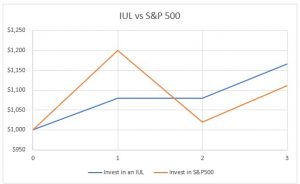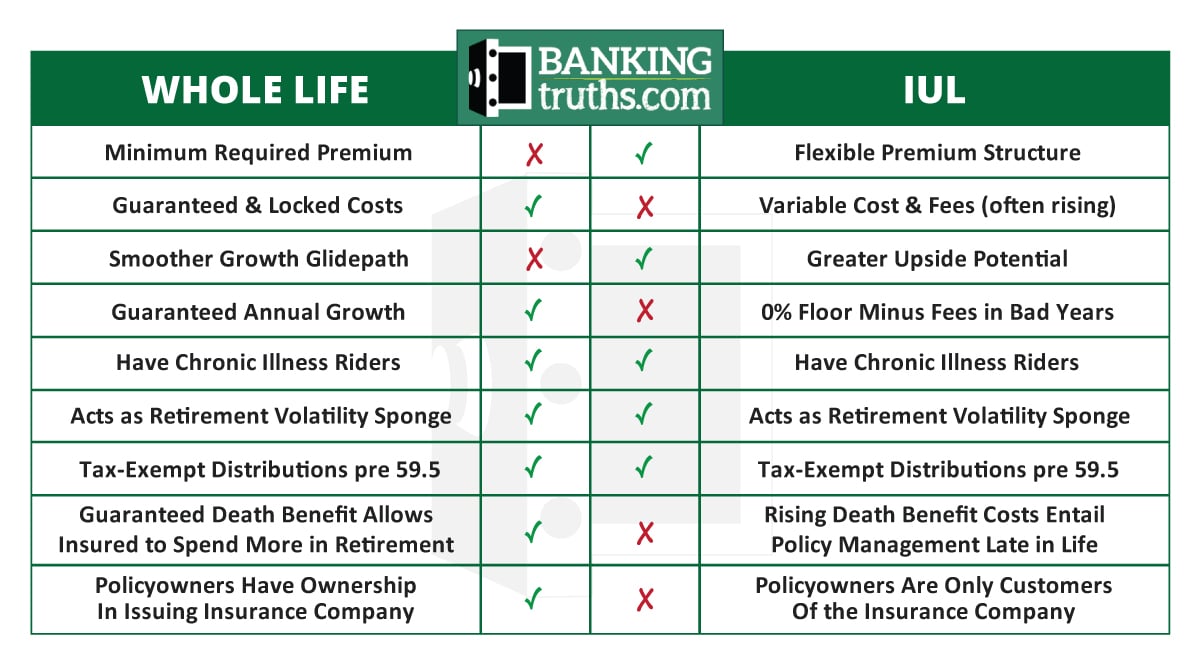All Categories
Featured
Table of Contents
Do they contrast the IUL to something like the Lead Overall Stock Market Fund Admiral Shares with no lots, a cost ratio (ER) of 5 basis factors, a turn over ratio of 4.3%, and an outstanding tax-efficient document of distributions? No, they compare it to some horrible proactively handled fund with an 8% load, a 2% ER, an 80% turnover proportion, and a dreadful record of temporary capital gain distributions.
Mutual funds typically make yearly taxable distributions to fund owners, even when the worth of their fund has decreased in value. Shared funds not just need revenue coverage (and the resulting annual taxes) when the shared fund is going up in worth, yet can likewise impose income tax obligations in a year when the fund has gone down in worth.
That's not how shared funds function. You can tax-manage the fund, collecting losses and gains in order to lessen taxed distributions to the investors, yet that isn't somehow going to change the reported return of the fund. Just Bernie Madoff types can do that. IULs stay clear of myriad tax traps. The possession of shared funds might require the common fund proprietor to pay approximated taxes.

IULs are simple to place to make sure that, at the owner's fatality, the beneficiary is not subject to either income or estate taxes. The same tax reduction techniques do not function nearly as well with shared funds. There are numerous, usually expensive, tax traps connected with the timed buying and selling of mutual fund shares, traps that do not relate to indexed life insurance policy.
Possibilities aren't extremely high that you're mosting likely to be subject to the AMT because of your common fund circulations if you aren't without them. The remainder of this one is half-truths at ideal. While it is true that there is no income tax obligation due to your successors when they inherit the profits of your IUL policy, it is likewise true that there is no revenue tax obligation due to your beneficiaries when they acquire a shared fund in a taxable account from you.
Maximum Funded Indexed Universal Life
There are better ways to prevent estate tax obligation problems than buying investments with low returns. Mutual funds may trigger earnings tax of Social Security benefits.

The development within the IUL is tax-deferred and might be taken as free of tax earnings by means of financings. The policy owner (vs. the mutual fund supervisor) is in control of his/her reportable income, thus enabling them to decrease or perhaps remove the taxation of their Social Safety benefits. This set is wonderful.
Right here's an additional minimal issue. It holds true if you get a mutual fund for say $10 per share just before the distribution date, and it disperses a $0.50 circulation, you are after that going to owe tax obligations (most likely 7-10 cents per share) although that you haven't yet had any kind of gains.
In the end, it's really regarding the after-tax return, not exactly how much you pay in taxes. You are going to pay more in taxes by utilizing a taxable account than if you get life insurance coverage. You're additionally probably going to have more cash after paying those taxes. The record-keeping requirements for owning shared funds are substantially much more complicated.
With an IUL, one's documents are maintained by the insurance coverage business, duplicates of yearly statements are mailed to the proprietor, and distributions (if any kind of) are completed and reported at year end. This one is likewise kind of silly. Naturally you should keep your tax records in situation of an audit.
Best Iul Products
Barely a reason to buy life insurance policy. Shared funds are frequently component of a decedent's probated estate.
In enhancement, they are subject to the hold-ups and expenditures of probate. The earnings of the IUL policy, on the various other hand, is constantly a non-probate circulation that passes outside of probate directly to one's named recipients, and is for that reason not subject to one's posthumous creditors, unwanted public disclosure, or comparable hold-ups and expenses.
We covered this one under # 7, but just to summarize, if you have a taxable shared fund account, you have to put it in a revocable count on (or perhaps easier, make use of the Transfer on Death classification) to avoid probate. Medicaid disqualification and lifetime income. An IUL can supply their owners with a stream of earnings for their entire life time, despite just how long they live.

This is valuable when arranging one's events, and transforming properties to income before an assisted living home arrest. Common funds can not be transformed in a comparable manner, and are generally considered countable Medicaid possessions. This is one more dumb one advocating that inadequate people (you recognize, the ones who need Medicaid, a federal government program for the poor, to spend for their nursing home) must use IUL rather than common funds.
Iul Vs Whole Life
And life insurance policy looks terrible when contrasted relatively versus a pension. Second, individuals that have money to buy IUL above and beyond their pension are going to need to be terrible at handling money in order to ever get approved for Medicaid to spend for their retirement home costs.
Persistent and incurable ailment rider. All plans will certainly permit an owner's simple access to money from their policy, usually forgoing any surrender charges when such people experience a severe illness, require at-home care, or become constrained to an assisted living facility. Mutual funds do not supply a similar waiver when contingent deferred sales fees still put on a shared fund account whose proprietor needs to market some shares to fund the expenses of such a stay.
How To Sell Universal Life Insurance
You get to pay more for that advantage (cyclist) with an insurance coverage plan. Indexed universal life insurance policy offers death advantages to the beneficiaries of the IUL owners, and neither the owner nor the beneficiary can ever before shed money due to a down market.
Currently, ask yourself, do you in fact require or desire a fatality advantage? I certainly do not need one after I reach financial self-reliance. Do I want one? I intend if it were low-cost sufficient. Of course, it isn't economical. Generally, a purchaser of life insurance policy pays for real expense of the life insurance coverage advantage, plus the expenses of the plan, plus the earnings of the insurer.
Universal Life Policy Calculator
I'm not entirely sure why Mr. Morais threw in the entire "you can not lose money" once again right here as it was covered quite well in # 1. He simply desired to repeat the very best selling factor for these points I expect. Once again, you don't shed small dollars, yet you can shed actual dollars, in addition to face severe possibility price because of reduced returns.

An indexed global life insurance policy policy owner might exchange their plan for a completely different policy without activating earnings taxes. A mutual fund owner can not move funds from one shared fund company to another without marketing his shares at the previous (therefore triggering a taxed event), and buying brand-new shares at the latter, often subject to sales charges at both.
While it holds true that you can exchange one insurance plan for an additional, the reason that individuals do this is that the initial one is such a dreadful plan that also after buying a new one and going with the early, unfavorable return years, you'll still come out in advance. If they were offered the ideal plan the initial time, they should not have any type of wish to ever before trade it and go with the very early, negative return years once again.
Latest Posts
Cost Of Universal Life Insurance
Equity Indexed Whole Life Insurance
Guaranteed Universal Life Insurance Quotes